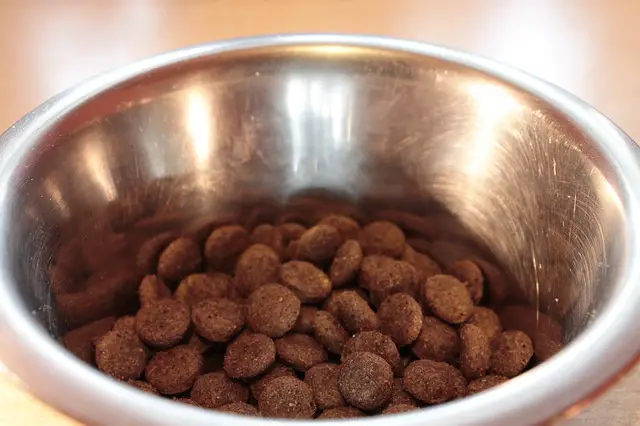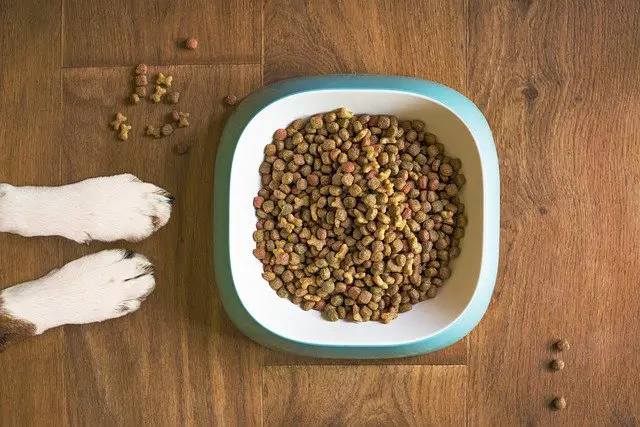Feeding a puppy is pretty much like feeding a baby – neither chooses what to eat, and it is your responsibility to fulfill its nutritional requirements—making the right feeding choices can be challenging. Things are simple when puppies need milk solely. However, after reaching the age of 5 weeks, things become a bit more complicated.
Can 5-Week Puppies Eat Dry Food?
Puppy owners often ask – Can 5-week old puppies eat dry food? Yes, 5-week old puppies can eat dry dog food. However, there are two main caveats. First, the kibble must be formulated exclusively for puppies. Secondly, the puppy kibble must be soaked (in water, yogurt, puppy milk formula).
From a nutritional perspective when 5-weeks old puppies are at a crossroad. If fully weaned, they can thrive solely on soaked kibble and wet foods. If not weaned, they can still use their mother’s milk and be additionally supported with a puppy kibble formula.
In this article, we will discuss the nutritional needs of 5 weeks old puppies. We will explain what puppies can and cannot eat, how much, and based on what schedule.
What should 5-week old puppies eat with dry food?

At the age of five weeks, puppies can safely start eating well-soaked dry foods. Based on the circumstances, they will still have available milk and an occasional kibble meal.
When adding kibble to your puppy’s menu, the two main concerns are using a kibble formula that is designed specifically for puppies and soaking the kibble before serving.
Puppies have different nutritional needs than adult dogs, thus requiring unique formulas. As for the soaking, although puppies can manage dry kibble (some easier than others), soaking comes with a few significant benefits.
The benefits of soaked kibble for 5-week old puppies
There are several reasons why serving soaked kibble is better than non-soaked kibble.
Lack of teeth
5-weeks old puppies do not have grown baby teeth. You make it softer and mushy by soaking the kibble, thus enabling your puppy to eat without having to chew.
Even later on, when the baby teeth start showing, they are too fragile and can easily get broken if exposed to hard kibble.
Introducing the chewing concept
In addition to not being able to chew correctly, puppies do not know how to chew. The only thing they have ever eaten is milk, and milk does not require chewing. By soaking the kibble, you are slowly teaching your puppy how to chew.
Prevention of gum injuries
The puppy’s gums are exceptionally sensitive and prone to injuries and bleeding. On the other hand, dry kibble can have sharp ends and damage those fragile gums, especially if broken.
Better hydration
Young puppies are very delicate creatures that can easily become dehydrated. In contrast, some puppies are keen water drinkers others are not. By offering soaked kibble, you are ensuring an adequate water intake.
Increased palatability
Dry kibble is not very aromatic. However, when mixed with warm water, the water will release the kibble’s aroma, thus making the meal more pleasant and tempting.
Decreased choking hazard
This is closely related to the fact that puppies are not familiar with the chewing concept. Basically, unaware of what to do with the dry food, puppies can quickly inhale a kibble or two and start choking. Soaked kibble is much easier to cough out.
How to soak the kibble for my 5-week old puppy?

Soaking is pretty much a straightforward procedure – you just need to follow these pieces of advice:
- Let the kibble soak for long enough – the exact timing might depend on the type of kibble and soaking medium, but the general rule of thumb is to let the food soak for around 20 minutes.
- Do not over-soak the kibble – over-soaking (more than 30 minutes) can be dangerous because the combination of food and warm water creates a perfect breeding ground for bacteria.
- Do not add too much soaking medium – adding more liquid than the kibble can absorb poses a choking hazard and should be avoided.
How much dry food should 5-week old puppies eat?

The amount of food a 5-weeks old puppy needs is a widely debated topic. The most popular opinion is that measuring the food is impractical and needs to be avoided.
Young puppies are growing at swift paces, and their nutritional requirements change daily. Plus, they are still feeding on their mothers’ milk, thus ensuring the majority of their nutritional needs via the milk.
Therefore, the general rule of thumb is to offer the soaked kibble and let the puppy eat until it walks away. The walking away is a sign it is full and done eating.
However, if you think this leads to overfeeding, it is advisable to limit the feeding. Common signs of overfeeding include vomiting immediately after the meal and severe belly distension.
How often should 5-week old puppies eat dry food?
Puppies spend most of their time sleeping. The ideal feeding time is just after they took a nap. In general, most puppies take naps of around two to three hours. This timeframe is enough for their bodies to digest the given food.
You can feed your puppy a smaller amount of food after every nap or a larger amount after every second nap. In general, a 5-weeks old puppy should not have fewer than five meals per day.
Giving the same amount of food but divided into less than five separate meals can lead to stomach distension. This increases the dog’s chance of weight gain and developing gastric dilatation and volvulus or bloat in the long run.
What if my 5-weeks old puppy is vomiting and has diarrhea?
The top four most common causes of vomiting and diarrhea in puppies are:
- Eating non-edible items (dirt, fabric, wood)
- Worm infestations
- Over-eating
- Eating foods that are hard to digest.
All issues require prompt and adequate veterinary attention. Vomiting and diarrhea, especially in puppies, can quickly lead to dehydration. Dehydration is a potentially life-threatening condition.
In such cases, in addition to the specific therapy, the vet will recommend feeding a bland diet for a couple of days. When it comes to puppies, bland diets refer to the mixture of boiled plain chicken and rice. Considering your 5-weeks old puppy’s inability to chew, you should put the mixture in a food processor before serving.
The vet might recommend hospitalizing the pup – intensive care, intravenous fluids, and close monitoring in more severe cases.
What if my 5-weeks old puppy is not eating their dry food/food at all?

Puppies might start expressing their fussy eating habits at an early age. However, if your puppy refuses to eat entirely or is showing some additional red flags, you need to contact your veterinarian and ask for an emergency visit.
Puppies are particularly fragile creatures, and things can go from bad to worse in no time. The sooner you seek veterinary attention, the sooner the vet will get to the bottom of things, and your puppy will be back to its usual self.
Conclusion
The age of 5 weeks is when you can get creative and start adding kibble to your puppy’s menu. Ideally, when 5-weeks old, your puppy will still feed on milk from its mother and additionally supported with soaked kibble formulated for puppies.
Not all puppy kibble brands are of equal quality. You need to choose a reputable brand that clearly states the ingredients it uses during manufacturing. With so many brands available on the market, finding the right one can be an overwhelming task.
If you are not sure which kibble brand is best for your puppy, ask your trusted veterinarian for advice. Alternatively, you can even consult with a licensed canine nutritionist.
FAQs
Can 5-week old puppies eat hard food?
Yes, 5-week old puppies can eat hard food as long it is well-soaked. At this point, puppies do not have teeth and cannot chew the food hence the soaking. What you use for a soaking medium depends on you and your puppy’s preferences – chicken broth, plain water, yogurt, puppy milk formula.
Why is my puppy not eating dry food?
Young puppies are not interested in eating dry food. Simply put, they do not know what dry food is and do not need it as they can successfully thrive on the milk their mothers provide. However, when between three and four weeks of age, puppies become interested in solid foods. So, if your puppy is younger than three weeks and not eating dry food is basically because it does not know what dry food is and does not need it.
How do you soak puppy kibble?
It is advisable to soak the puppy food (in lukewarm water or other soaking medium) for about 20 minutes before serving it. Many puppies will be able to eat the kibble even without soaking it. However, their teething gums are very sensitive, and kibble can be sharp. Therefore, by serving non-soaked food, you risk injuring your puppy’s gums.
How much water should I add to my puppy’s dry kibble?
For young puppies, the recommended dry kibble to water ratio is 1/3 to 2/3. However, the exact ratio may depend on how long you are letting the kibble soak, what you use as a soaking medium and your puppy’s chewing powers.

